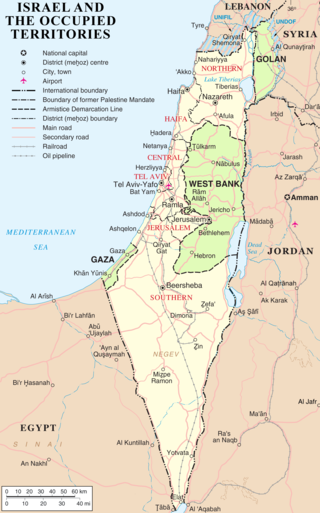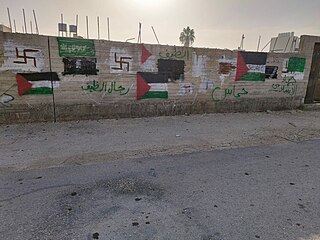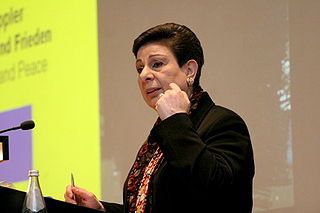Related Research Articles

Palestinians or Palestinian people, also referred to as Palestinian Arabs, are an ethnonational group descending from peoples who have inhabited the region of Palestine over the millennia, and who are today culturally and linguistically Arab.

Palestinian Christians are Palestinians who are Christians. They include citizens of both Israel and the State of Palestine and members of the Palestinian diaspora. In the wider definition, including people with full or partial Palestinian Christian ancestry, the term can be applied to an estimated 500,000 people worldwide as of the year 2000. Palestinian Christians belong to one of a number of Christian denominations, including Eastern Orthodoxy, Oriental Orthodoxy, Catholicism, Anglicanism, Lutheranism, other branches of Protestantism and others. Bernard Sabella of Bethlehem University estimates that 6% of the Palestinian population worldwide is Christian and that 56% of them live outside of the region of Palestine. In both the local dialect of Palestinian Arabic and in Classical Arabic or Modern Standard Arabic, Christians are called Nasrani or Masihi. Hebrew-speakers call them Notzri, which means Nazarene.

The United Nations Relief and Works Agency for Palestine Refugees in the Near East is a UN agency that supports the relief and human development of Palestinian refugees. UNRWA's mandate encompasses Palestinians displaced by the 1948 Palestine War and subsequent conflicts, as well as their descendants, including legally adopted children. As of 2019, more than 5.6 million Palestinians are registered with UNRWA as refugees.
Palestinian refugees are citizens of Mandatory Palestine, and their descendants, who fled or were expelled from their country over the course of the 1947–1949 Palestine war and the Six-Day War. Most Palestinian refugees live in or near 68 Palestinian refugee camps across Jordan, Lebanon, Syria, the West Bank and the Gaza Strip. In 2019 more than 5.6 million Palestinian refugees were registered with the United Nations.

The music of Palestine is one of many regional subgenres of Arabic music. While it shares much in common with Arabic music, both structurally and instrumentally, there are musical forms and subject matter that are distinctively Palestinian.

Media coverage of the Arab–Israeli conflict by journalists in international news media has been said to be biased by both sides and independent observers. These perceptions of bias, possibly exacerbated by the hostile media effect, have generated more complaints of partisan reporting than any other news topic and have led to a proliferation of media watchdog groups.
The Palestinian NGOs Network (PNGON) is a non-profit, non-governmental organization with a mandate to protect the environment of Palestine by acting as a coordinating body for Palestinian environmental organizations located in the West Bank and Gaza Strip. PNGON was initiated after the 2000 al-Aqsa Intifada due to heightened demands for Palestinian environmental organizations to defend the Palestinian environment.

Israel has occupied the Palestinian territories and the Golan Heights since the Six-Day War of 1967. It used to occupy the Sinai Peninsula and southern Lebanon as well. Prior to Israel's victory in the Six-Day War, occupation of the Palestinian territories was split between Egypt and Jordan, with the former having occupied the Gaza Strip and the latter having annexed the West Bank; the Sinai Peninsula and the Golan Heights were under the sovereignty of Egypt and Syria, respectively. The first conjoined usage of the terms "occupied" and "territories" with regard to Israel was in United Nations Security Council Resolution 242, which was drafted in the aftermath of the Six-Day War and called for: "the establishment of a just and lasting peace in the Middle East" to be achieved by "the application of both the following principles: ... Withdrawal of Israeli armed forces from territories occupied in the recent conflict ... Termination of all claims or states of belligerency and respect for and acknowledgment of the sovereignty, territorial integrity and political independence of every State in the area and their right to live in peace within secure and recognized boundaries free from threats or acts of force."

The state of human rights in the West Bank and Gaza Strip characterizes the State of Palestine as an authoritarian regime according to The Economist Democracy Index.

Naseer H. Aruri was an American scholar-activist and expert on Middle East politics, U.S. foreign policy in the Middle East and human rights. Aruri was Chancellor Professor (Emeritus) of Political Science, having served on the faculty of the University of Massachusetts-Dartmouth from 1965-1998. In 1993, he was the recipient of the College of Arts and Sciences “Distinguished Research Award”. Aruri’s papers have been preserved and are on display at the Claire T. Carney Library Archives and Special Collections at UMASS-Dartmouth.

The following outline is provided as an overview of and topical guide to the State of Palestine:
Palestinian law is the law administered by the Palestinian National Authority within the territory pursuant to the Oslo Accords. It has an unusually unsettled status, as of 2023, due to the complex legal history of the area. Palestinian law includes many of the legal regimes and precepts used in Palestinian ruled territory and administered by the Palestinian Authority and Hamas, which is not an independent nation-state.

Al-Quds Arab Capital of Culture was the name given to Arab Capital of Culture programme in 2009. The programme, organised by UNESCO and the Arab League, is designed to promote Arab culture and encourage cooperation in the Arab world. The 2009 event was the 14th programme since its establishment in 1996.

Racism in the Palestinian territories encompasses all forms and manifestations of racism experienced in the Palestinian Territories, of the West Bank, Gaza, and East Jerusalem, irrespective of the religion, colour, creed, or ethnic origin of the perpetrator and victim, or their citizenship, residency, or visitor status. It may refer to Jewish settler attitudes regarding Palestinians as well as Palestinian attitudes to Jews and the settlement enterprise undertaken in their name.

On Sunday, April 18, 2010, the American Friends Service Committee (AFSC) initiated an event titled "The Chicago Hearing: Does U.S. Policy on Israel and Palestine Uphold Our Values?", modeled after a meeting of a United States Congressional fact-finding committee.

The lives of Palestinian women have transformed throughout many historical changes including Ottoman control, the British Mandate, and Israeli occupation. The founding of the Palestine Liberation Organization in 1964 and the later establishment of the Palestinian Authority in 1994 also played a role in redefining the roles of women in Palestine and across the Palestinian diaspora. Women have been involved in resistance movements in Palestine, Jordan, Syria, and Lebanon throughout the 20th century and into the 21st century.
Lisa Taraki is an Afghan-born Palestinian journalist, teacher and sociologist. She is an associate professor of sociology at Birzeit University in the West Bank and former Dean of its graduate students. She is the co-founder of the university's Institute of Women's Studies and founding Director of the doctoral program in social sciences. Taraki is also the co-founder of the Palestinian Campaign for the Academic and Cultural Boycott of Israel (PACBI), a campaign that spearheaded the BDS movement and advocates for academic and cultural boycotts of Israel until it stops what they see as violations of the Palestinians' human rights. She has also served as the director of the board of trustees for Al Haq.

Al-Haq is an independent Palestinian human rights organization based in the city of Ramallah in the West Bank. Founded in 1979, Al-Haq monitors and documents human rights violations committed by parties to the Israeli–Palestinian conflict, issuing reports on its findings and producing detailed legal studies. It is in special consultative status with ECOSOC since 2000.

Hanan Daoud Mikhael Ashrawi is a Palestinian politician, activist, and scholar.
The Palestinian NGOs Network is an umbrella organization of about 30 Palestinian non-government organisations (NGOs) in the Palestinian territories formed to enhance coordination, consultation and cooperation between member NGOs and to strengthen Palestinian civil society and contribute to the establishment of a Palestinian state. PNGO was formed in September 1993, and as of January 2020, had 135 member NGOs operating in the West Bank, Gaza Strip and East Jerusalem.
References
- ↑ About Ramallah Center for Human Rights Studies, Ramallah Center for Human Rights Studies. Retrieved 22 January 2011.
- ↑ Tasamuh (Tolerance) Journal, Ramallah Center for Human Rights Studies. Retrieved 25 January 2011.